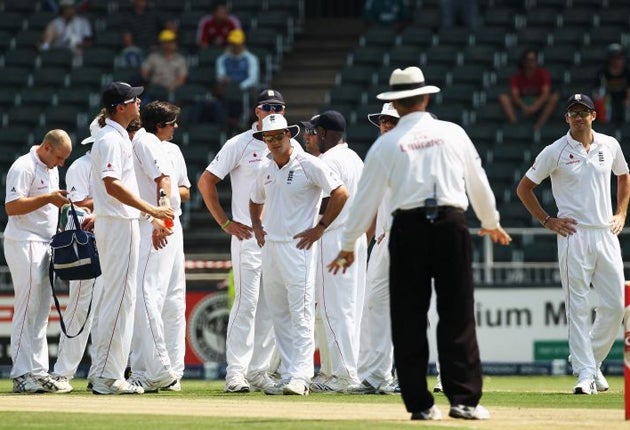England furious as Harper's blunder costs crucial wicket
Official complaint will follow astonishing failure to turn on volume for referral of Smith catch

England intend to vent their fury at being denied a key wicket yesterday by making an official complaint to the match referee. The focus of their ire will be the Umpire Review System in general but elite umpire Daryl Harper in particular.
The tourists want the International Cricket Council and the world to know that they are extremely angry at a decision that may have undermined their chances of winning their Test series against South Africa. It could easily bring an adjournment or a termination to Harper's career at the top.
Harper, the third umpire in the fourth Test who is responsible for reviewing verdicts on TV replays, decided that South Africa's opening batsman, Graeme Smith, had not edged the ball when he was on 15.
Smith, who would go on to make a thunderous 105 to put his side in total command of the match, had already been given not out caught behind by the on-field umpire, Tony Hill. But so convinced were England that the noise they heard was the ball shaving Smith's bat that they immediately asked for a review.
It was to transpire that Harper had not turned up the volume on his stump microphone, presumably having neither properly taken in the protocol that was agreed for this series with regard to stump microphones nor seen This is Spinal Tap where the significance of turning up the volume to 11 was first outlined.
The England coach, Andy Flower, confirmed that he had twice been to see the match referee, Roshan Mahanama, about the incident. ''I first asked for clarification on the process and he explained that the match referee gets a different audio feed to Sky television,'' he said.
''We found out that wasn't correct and one audio feed is used for everyone, and the second time he said that Daryl Harper had not switched up the volume on his mic and that is why we have heard the nick but the third umpire hasn't. If it wasn't such a serious match for us I would have found it amusing, I think it's very disappointing. They said they did not deem it necessary to turn up the volume. It does not reflect well on the ICC.''
Smith meanwhile simply denied that he had hit it. ''There definitely was a noise but I didn't feel that I touched the ball,'' he said. It can happen, maybe I did, maybe I didn't. I thought it was my thumb on the handle.''
Flower had no argument with the original decision by one field umpire, Tony Hill, which allowed Smith his initial reprieve, saying: ''The umpire makes an honest decision based on what he sees and hears.''
But he found it difficult to understand the actions of Harper, who has made mistakes before both with and without technology. He is on the ICC's elite list but his status must be under threat if he loses the faith of the players.
''I have seen it and it is very clearly an edge,'' said Flower. ''There are a couple of things we find illogical. Number one is that we don't use the technology for no balls and there have been a couple of incidents when Kevin Pietersen and Graeme Smith have been out to no balls in this series.
''Number two is that Dave Richardson, the ICC cricket manager, and Roshan Mahanama before the series explained to us in the absence of a snickometer or hot spot they would use an increased volume on stump mic for catches behind, they would turn up the volume for referrals, and we find it very disappointing they deemed this unnecessary.''
Part of the problem, apart from Harper's apparent poor interpretation of the incident, is the lack of standardised technology. In the series between England and South Africa, the only aid for possible edged catches is the stump microphone, hardly conclusive evidence. But in the current series between Australia and Pakistan, officials have the use of Hot Spot, a gadget based on heat technology which shows whether ball did indeed make contact with bat.
Unfortunately, there are only four Hot Spot cameras in the world and the cost of using them in a series is in the region of £5m, well out of the reach of the impecunious South African Broadcasting Corporation, the rights holder in this series.
The only way to avoid embarrassments and to create a level playing field is for the ICC to pay the bills. Otherwise cricket will look dafter on many more occasions. Hot Spot is not foolproof – nothing is – but it would have done the trick yesterday.
England meanwhile have a match to save as well as technology to worry about.
Subscribe to Independent Premium to bookmark this article
Want to bookmark your favourite articles and stories to read or reference later? Start your Independent Premium subscription today.

Join our commenting forum
Join thought-provoking conversations, follow other Independent readers and see their replies